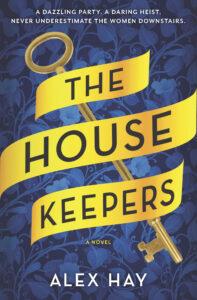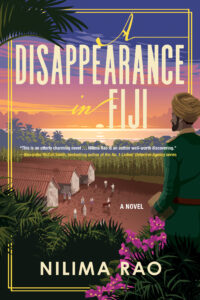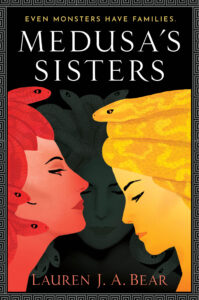New Voices: Lauren J. A. Bear, Monica Chenault-Kilgore, Alex Hay & Nilima Rao
WRITTEN BY MYFANWY COOK
Lauren J. A. Bear, Monica Chenault-Kilgore, Alex Hay, and Nilima Rao share their love of history and the enjoyment of transforming lives from the past into memorable historical fiction.
 The Housekeepers (Headline Review/Graydon House, 2023) is Alex Hay’s debut novel. But, as he explains, “Truthfully, I have a whole stack of unpublished manuscripts hiding in a drawer. So, what made the experience of writing this book different to those others? Quite simply, it was FUN.”
The Housekeepers (Headline Review/Graydon House, 2023) is Alex Hay’s debut novel. But, as he explains, “Truthfully, I have a whole stack of unpublished manuscripts hiding in a drawer. So, what made the experience of writing this book different to those others? Quite simply, it was FUN.”
Hay relates: “I was itching to write a heist novel, because I’d always adored the slippery engineering of that plot. And I’d been longing to write about London in the early 1900s, to play with the gorgeous textures and details of the era. I had in mind the big hats and house parties of popular imagination: sweeping lawns, impossible luxury, a gilded age. Where better to set a glamorous, rackety, high-stakes burglary?”
However, delving into his research, he “discovered books and articles that gave a far more nuanced view of the period, capturing the social, economic and political forces that made 1905 a febrile, fascinating year to play with,” he says. “On the one hand, we find an old world, Victorian England, tight-laced and gaslit. On the other we have a brave new century, motorised, electrified. The suffragettes were marching to their first protests; revolution was afoot in Russia. Rules were changing. Servants were rebelling against their masters. Not all that glittered was gold…”
And so, “What better starting point for a book about a housekeeper seeking revenge?”
He continues: “At the heart of the story is a sumptuous mansion inspired by real-life houses that once stood all around West London. They were built for powerful men, containing decadent and costly treasures, attended by a (seemingly) endless supply of loyal servants. Planning this book, I wondered, what might happen if some of the women working downstairs decided to claim some of the privilege lurking upstairs for themselves?”
The next stage for Hay was his cast. “And oh, how I love them,” he says. “Mrs King, charismatic ringleader. Winnie Smith, former housekeeper on Park Lane, squashed by the world. Mrs Bone, a criminal queen, entering the house incognito as a lowly servant. Miss de Vries, the elusive mistress of Park Lane, planning the most magnificent ball of the season. Hephzibah Grandcourt, onetime scullery maid, now a fabulous music hall star (and con-woman). Alice Parker, insanely talented seamstress – and spy. And last but not least, Jane-one and Jane-two, housemaids with a difference, with a penchant for the trapeze…”
Which is why for Hay, “Building the world of The Housekeepers was the most joyous writing experience of my life – and a reminder of why I adore writing historical fiction.”
 Nilima Rao, author of A Disappearance in Fiji (Soho, 2023), is, as she states, “a Fijian Indian Australian, a combination which is reasonably well understood in Oceania, but raises eyebrows elsewhere in the world. I was born in Fiji, am of Indian heritage, and we moved to Australia when I was three. I grew up vaguely knowing that some generations ago, my family had gone from India to Fiji to work in the sugar cane plantations. The how and why of this migration was a matter of no interest to me for my childhood and early adulthood, absorbed as I was in modern Australian life.”
Nilima Rao, author of A Disappearance in Fiji (Soho, 2023), is, as she states, “a Fijian Indian Australian, a combination which is reasonably well understood in Oceania, but raises eyebrows elsewhere in the world. I was born in Fiji, am of Indian heritage, and we moved to Australia when I was three. I grew up vaguely knowing that some generations ago, my family had gone from India to Fiji to work in the sugar cane plantations. The how and why of this migration was a matter of no interest to me for my childhood and early adulthood, absorbed as I was in modern Australian life.”
Rao’s trip to India in her late twenties changed her “perspective dramatically,” she says. “Travelling in India was an emotional experience. The depth and breadth of poverty was confronting. Driving from Delhi to Agra, I witnessed a woman on the side of the road picking up cow dung with her bare hands, likely for fuel. I was in tears. She was a living, breathing, visual representation of what it might have meant if my forebears hadn’t gone to Fiji. It left me wondering: who were these people, who came before me, who had made this decision that gave me a life they couldn’t have imagined?”
The experience impelled her to start “researching the history of Indians in Fiji and learning about the indentured servitude program, with its various avenues for corruption and exploitation,” she relates. “The program was started to provide cheap labour to European colonies after slavery was abolished in the British empire, and sent Indians to places such as Mauritius, the Caribbean, Malaysia and of course, Fiji.”
As she discovered, “The theory was that people were signing up to the indenture contract of their own free will. The reality was that these people were overwhelmingly poor and illiterate. They couldn’t read the contracts they were signing and had to trust the recruiters, who were paid per recruit. They were told lies about easy work in a place just past Calcutta, never realising that they were actually going halfway around the world and signing up to five years of hardship. The stories I read about the commoditization of women under the program were particularly heartbreaking. I realised that I wanted to write a book that shed a light on this exploitative program, about what my great grandparents went through.”
 The inspiration for Lauren J. A. Bear’s Medusa’s Sisters (Ace, 2023) “came to me like that – a clear, instantaneous spark – in a nursery six years ago,” the author says. “I was on maternity leave from my middle school Humanities job, up late feeding my newborn daughter, when a sleep-deprived thought struck: Medusa was one of the Gorgons, so who were the others? According to a 19th-century classicist’s quote on Wikipedia, Stheno and Euryale were nothing, only ‘appendages’ to their famous sister. Now this was 2017, a politically charged time, and reading such a dismissive statement overwhelmed me with rage and sorrow. No woman – no human – is an appendage. My child would never be diminished as somebody’s plus one!”
The inspiration for Lauren J. A. Bear’s Medusa’s Sisters (Ace, 2023) “came to me like that – a clear, instantaneous spark – in a nursery six years ago,” the author says. “I was on maternity leave from my middle school Humanities job, up late feeding my newborn daughter, when a sleep-deprived thought struck: Medusa was one of the Gorgons, so who were the others? According to a 19th-century classicist’s quote on Wikipedia, Stheno and Euryale were nothing, only ‘appendages’ to their famous sister. Now this was 2017, a politically charged time, and reading such a dismissive statement overwhelmed me with rage and sorrow. No woman – no human – is an appendage. My child would never be diminished as somebody’s plus one!”
As a result, Bear “became obsessed with discovering the Gorgons’ full story,” she continues. “I needed to understand how one sister became a legend and the other two became lost. I went directly to the primary source material: Homer, Hesiod, Aeschylus, Apollodorus, Hyginus, and Ovid. It was a bittersweet quest. I couldn’t find much of anything, and it left me disappointed and dissatisfied. I couldn’t let it go; I knew I had to create a more empowering narrative for Stheno and Euryale – one that made them feel real, not just murderous hags. After all, nobody is born evil – monsters are made – and I was going to make the Gorgon sisters matter.”
Bear believes that we “live in an exciting time, a time when people care about perspective and bias, about challenging the given testimony and asking better questions. This applies to both real history and storytelling. Rewriting any story can be a powerful act of subversion, a way to transfer power to the mistreated and forgotten. My intention as a writer isn’t necessarily to deliver some great message, it is to bear witness, and with Medusa’s Sisters I focus on the particular plights of ancient women.”
 Monica Chenault-Kilgore’s Long Gone, Come Home (Graydon House, 2023), a coming-of-age drama set in the 1930s through early 1940s, traces her main characters’ experiences “during the vestiges of the Great Depression, the ramp up to World War II, stifling Jim Crow era practices, and the emerging art, music, and literature scene of the Harlem Renaissance.”
Monica Chenault-Kilgore’s Long Gone, Come Home (Graydon House, 2023), a coming-of-age drama set in the 1930s through early 1940s, traces her main characters’ experiences “during the vestiges of the Great Depression, the ramp up to World War II, stifling Jim Crow era practices, and the emerging art, music, and literature scene of the Harlem Renaissance.”
The novel, she reveals, “developed from a desire to create a story that illustrates how women come into and trust their power to build, strengthen and preserve family and community connections despite adversity.”
Chenault-Kilgore was inspired by her “mother’s tales of her life as a young woman living a bohemian artist life in Chicago surrounded by jazz musicians at after hour spots, sipping brown ‘juice’ and smoking endless cigarettes,” she says. “Watching my mother while she listened, with eyes closed, to the music of Ahmad Jamal, The Modern Jazz Quartet or Wes Montgomery, I imagined she was reliving cool moments in her life. I, too, was enraptured by the music. A jazz soundtrack floated in my head as I wrote. As the heroine travels from juke joints, nightclubs and corner bars, music provides a backdrop for her cultural awakening.”
Chenault-Kilgore’s mother’s collection of friends had fascinated her. “Beautiful, well-coifed, and stylish women who had romantic adventures while building thriving businesses. To me, they were like movie stars. Not only queens of the side hustle, as they call it now, but they were akin to the bronze beauties that graced the pages of Ebony and Jet magazine. They held their families close while chasing their dreams.”
Her mother, she says, had a “drive to correct social injustice. In Cincinnati, Ohio, where I was born and raised, she regularly wrote letters to elected officials and spoke out at community council meetings on civil rights issues such as discriminatory practices in jobs, housing, and education. She took my two brothers and I to countless marches, rallies, and fiery church gatherings where we shouted and protested and collected signatures.”
Given Chenault-Kilgore’s “pedigree, as an African American writer and child of a community activist,” she says, “storytelling, for me, must include the trials of our past and the promise of a better future. While researching historical facts and events to integrate within Long Gone, Come Home, I realized history is a cycle, not necessarily a linear path toward a singular destination. The struggles then, mirror today. It was a volatile time of social turbulence – racial strife, the threat of an accelerating war and a day-to-day struggle for families due to economic imbalance.”
She maintains that “hope keeps better days tangible and within our grasp. My hope is that my writing brings to light those moments when ordinary unsung and forgotten people prevailed against unimaginable odds. We have a responsibility to learn from and honor our past so as not to repeat it.”
About the contributor: Myfanwy Cook is an Associate University Fellow and ‘creative enabler’. She is a writer of prose, who facilitates creative writing workshops. Please do contact (myfanwyc@btinternet.com) if you have been captivated by the writing of any debut novelists.
Published in Historical Novels Review | Issue 105 (August 2023)






